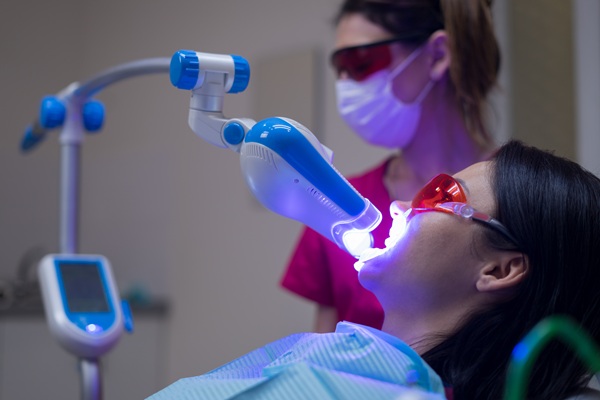Dental Implants Can Replace Dentures and Missing Teeth

Has your dentist recommended dental implants? This treatment option may sound bad at first, but it is a relatively simple procedure.
Keep reading to see how dental implants can restore your smile.
What are dental implants?
A dental implant is a tooth replacement that acts as both an artificial crown and an artificial root.
To help understand this, there are two major portions of each tooth: The portion you can see and the portion under the gums. The portion under the gums is the root. The inside of this section is the root canal. The visible portion of the tooth is called the crown, which you can remember because of its shape!
In effect, a dental implant replaces the part of the tooth that is both visible and not visible. An implant can be an effective and long-lasting solution for someone who has experienced severe tooth decay.
An implant is generally the last option after a dentist determines that a root canal or filling cannot save the tooth.
Advantages of dental implants
Preserve appearance
One major advantage of a dental implant is that it can preserve the appearance of your tooth. Since they take the place of both the crown and root of the tooth, they look and function just like a normal set of teeth. Your dentist can match the shape, size and color of your implant to look like nearby teeth.
Unlike dentures, you do not have to remove dental implants to clean them each night. Simply brush and floss to keep them in good condition.
Long lasting
Dental implants can last many years. While most will work for 15 years, some can even be functional for up to 25 years! The lifespan of your implants will depend largely on how you care for them.
Implants are not immune to infection. Bacteria can grow in the spaces between your implants and gums. Your overall oral health will determine the success of the implants, so practice daily hygiene.
More comfortable
Since implants are firmly rooted in your jawbone, they are often more comfortable than alternatives like dentures. They also come loose while eating, talking or during other activities. You do not have to deal with adhesives or bridges.
Dental implants are designed to feel more like real teeth. Because of this, they will cause less discomfort whenever you are using your jaw.
When is it time to speak with your dentist?
The best way to have a beautiful smile is to prevent tooth decay with proper care. You should also see the dentist every six months.
If you are concerned that you may lose a tooth or if you are thinking about switching from dentures to something more permanent, then it is a good time to speak with your dentist.
If you do not have a dentist, then call our office to learn more about dental implants and see if they will work for you.
Request an appointment here: https://www.emersondental.com or call Emerson Dental Associates at (201) 620-9998 for an appointment in our Emerson office.
Check out what others are saying about our dental services on Yelp: Dental Implants.
Recent Posts
Laser dentistry is a modern practice used for a number of dental procedures, ranging from root canals to oral cancer screenings. One of the most common laser dentistry procedures is gum reshaping, which has grown in popularity for both cosmetic and restorative purposes. When gum reshaping is chosen for cosmetic purposes, patients are typically hoping…
Many parents often forget the need to get a kid friendly dentist when choosing a dentist for their children. A kid friendly dentist offers additional benefits that are not available from a regular dentist's office. Some might also get confused when they encounter pediatric dentists and wonder if there is any difference. Pediatric dentists also…
There are benefits to choosing an experienced implant dentist over one who is relatively new in the profession. Dental implants require a more complex process that involves several steps, and choosing the right implant dentist may help make the process more convenient, less invasive, and safer.It is helpful to learn more about dental implants, how…
Are you considering implant supported dentures? This hybrid tooth replacement option is one that provides patients with stability and a natural-looking smile. Implant supported dentures can be used to replace teeth on the upper or lower arch. In the event that the lower arch of teeth needs to be replaced, patients are often curious about…


